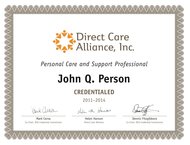A New Credential for Home Care Aides
Resource type: News
New York Times | [ View Original Source (opens in new window) ]
When the Direct Care Alliance first offered the test that would lead to becoming a credentialed “personal care and support professional,” Maria Frank, a 60-year-old home care aide in Nazareth, Pa., signed up.
 She didn’t need the certificate to land a job; she’d been on the job for more than two decades, and for the past 13 years had cared for the elderly through Home Instead, the national home care franchise. It was mostly for her own satisfaction that she wanted to pass the test.
She didn’t need the certificate to land a job; she’d been on the job for more than two decades, and for the past 13 years had cared for the elderly through Home Instead, the national home care franchise. It was mostly for her own satisfaction that she wanted to pass the test.
“It was hard,” reported Ms. Frank. “It’s a pretty long test.” Two hours, to be precise. But like 80 percent of the first 100 workers who took the test in a pilot project, she passed. Her certificate — her first professional credential — is in the mail.
The Direct Care Alliance, which represents hands-on employees who care for the elderly and disabled in facilities and in people’s homes, sees this credentialing process as key to elevating the home care work force. “These workers have a lot of knowledge and skills, but they don’t have a way to prove it,” said Helen Hanson, professional development manager at the alliance. “The credential is a way to show employers and prospective employers their professionalism.”
For the elderly and their families, finding competent, caring home care aides can be a daunting task. Do they go with someone advertising on Craigslist, hoping her references are reliable? Or hire through an agency, trusting that it has thoroughly vetted its employees? They’ll pay more for agency people, but the workers themselves will take home much less, and agency rules — many prohibit aides from driving their clients, for instance — may not dovetail with an elder’s needs. Yet hiring independently, unless an aide is already well known to the community, can be a scary prospect.
Even the nomenclature is confusing: there are personal care attendants and home care aides and home health aides. (And one wishes that the alliance hadn’t selected such a mouthful — “personal care and support professional” — for its new credential.)
But this is a field that resists standardization. Training and certification requirements for home care aides remain a hodgepodge. Thirty-five states regulate home care agencies and set varying requirements for their workers, said Bill Dombi, vice president for law at the National Association for Home Care and Hospice, which has also operated a certification program (currently suspended) for Medicare home health aides. But 15 have no regulations for agencies. And very few states regulate individual caregivers at all.
So a national credential for home care workers makes sense. The welter of state regulations may limit the usefulness of the Direct Care Alliance’s new testing program, said Marla Lahat, executive director of Home Care Partners, a nonprofit agency in Washington. Employers must still hire only a certified nursing assistant to comply with state laws.
But she thought the alliance’s credential could be a big help to independent aides who don’t work for agencies or to workers in states without such regulations. “They can say, ‘I’m not just a baby sitter or a housekeeper. I have skills. I passed a test,’ ” Ms. Lahat said.
The test itself contains 50 multiple-choice questions on topics like bathing and lifting techniques, ethics and safety, and questions on “situational judgment” that assess how effectively aides can respond to problems, emergencies and clients’ needs.
The Direct Care Alliance will begin offering its test in Florida, Arizona, Maine and California this spring — it costs $140, with volume discounts for groups — and hopes that 3,000 workers will take it this first year. Quarterly testing is the eventual goal.
“A lot of people, believe it or not, are hired to work in health care and they know nothing about it,” Ms. Frank said. “I know how to do my job.” Now that she’s got a personal care and support credential, her clients will know that too.
Paula Span is the author of “When the Time Comes: Families With Aging Parents Share Their Struggles and Solutions.”
The Direct Care Alliance is an Atlantic grantee.